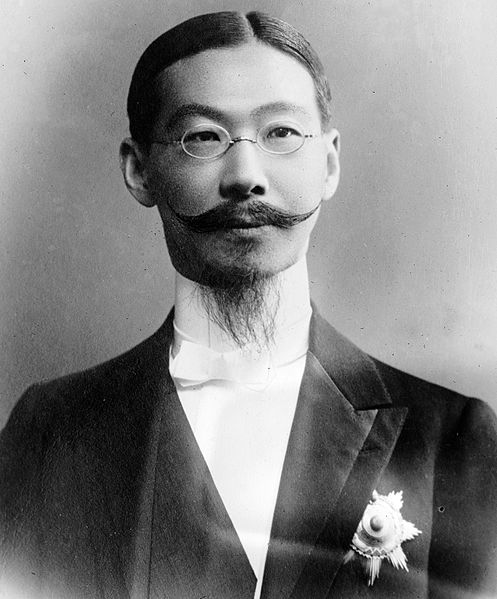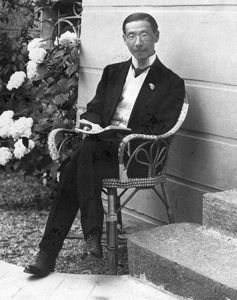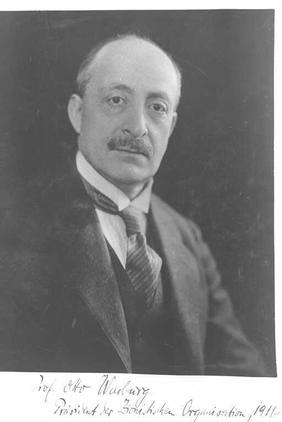<Back to Index>
- Premier of the Republic of China Lou Tseng - Tsiang, 1871
- President of the Zionist Organization Otto Warburg, 1859
PAGE SPONSOR


Lou Tseng-Tsiang (in the idiosyncratic Romanization that he used himself; simplified Chinese: 陆征祥; traditional Chinese: 陸徵祥; pinyin: Lu Zhengxiang; Wade - Giles: Lu Cheng-Hsiang; 12 June 1871 - 15 January 1949) was a Chinese diplomat and a Roman Catholic monk. He was twice Premier of the Republic of China and led his country's delegation at the Paris Peace Conference of 1919. He sometimes used the French name René Lou in earlier life, and his monastic name was Pierre - Célestin.
Lou was born in Zhejiang on 12 June 1871, and grew up in China, raised a Protestant in religion and a Confucianist in philosophy. His father, Lou Yong Fong, was lay catechist for a Protestant mission in Shanghai. He studied at home until the age of thirteen, when he entered the School of Foreign Language in Shanghai, specializing in French. He continued his education at the school for interpreters attached to the Foreign Ministry, and in 1893 he was posted to St Petersburg as interpreter (fourth class) to the Chinese embassy. At that time the diplomatic international language was French, but Lou also gained fluency in Russian. The ambassador, the reform minded Xu Jingcheng (Hsü Ching-ch'eng), took an interest in his career. Lou married a Belgian citizen, Berthe Bovy, in St Petersburg on 12 February 1899, and eventually converted to Roman Catholicism. The couple had no children.
His early years were marked by the Boxer Rebellion, during which his mentor, Xu Jingcheng, was beheaded in Beijing. Lou served the Qing regime as Chinese delegate at the first and second Peace Conferences in The Hague (1899 and 1907), as Minister to Belgium, and as Ambassador to Russia, but he never forgot the imperial government's betrayal of his "second father". When the 1911 Revolution broke out he was Ambassador in St Petersburg, and he took it upon himself, against the advice of his colleagues at other European capitals, to cable Beijing that there could be no hope of assistance from the Great Powers.
At the proclamation of the Chinese Republic in 1912, he joined the Party of Dr. Sun Yat-Sen, and served as Foreign Minister in the provisional government under President Yuan Shikai, March 1912 - September 1912. In August - September 1912 he also served as Prime Minister, but his lack of political clout forced his resignation, ostensibly for health reasons. He returned to the cabinet as Foreign Minister from November 1912 to September 1913, and reformed the Foreign Ministry: abolishing the complicated bureaucracy of the imperial commissions, requiring knowledge of foreign languages at all levels, and instituting modern civil service examinations for recruits. He managed to avoid being identified with any particular faction within the new government, but this relative political isolation meant that he was little able to influence policy, and he again resigned. On leaving office he became one of the founders of the Chinese Society of International Law.
From 27 January 1915 to 17 May 1916 he served as Minister of Foreign Affairs for a third time, in the "northern" government in Beijing which enjoyed international recognition, undertaking difficult negotiations with Japan and Russia. He became Foreign Minister for the fourth time on 30 November 1917. He served until 13 August 1920, with deputy minister Chen Lu becoming acting minister during his absence for the peace talks in Paris (November 1918 to December 1919).
Personally heading the Chinese delegation to the Paris Peace Conference of 1919, he refused to sign the Versailles Treaty because Article 156 transferred the German treaty territory in Shandong to Japan rather than returning sovereign authority to China. China was the only participating country not to sign the treaty.
From 1922 to 1927 Lou was China's envoy to the League of Nations in Geneva. At the death of his wife he retired from an active life, and in 1927 became a postulant, under the name Dom Pierre - Célestin, in the Benedictine monastery of Sint - Andries in Bruges, Belgium. He was ordained priest in 1935. During the Second World War he gave lectures about the Far East in which he propagandized for the Chinese war effort against Japan; German security agents noted the names of those attending but took no further action.
In August 1946 Pope Pius XII appointed Lou titular abbot of the Abbey of St Peter in Ghent. In his final years he hoped to return to China as a missionary, to fulfill the instructions Xu Jingcheng had given him at the beginning of his career:
Europe's strength is found not in her armaments, nor in her knowledge — it is found in her religion [...]. Observe the Christian faith. When you have grasped its heart and its strength, take them and give them to China.
His planned departure was postponed during the Chinese Civil War, and Dom Lou died in Belgium on 15 January 1949.
His best known work, published in 1945, is an autobiography in French, Souvenirs et pensées, summarizing his diplomatic and political career and his subsequent religious vocation, in which Christianity appears as a completion of the Confucian tradition of "pacifying the universe". The work was translated into English by Michael Derrick as Ways of Confucius and of Christ (London, 1948), and into Dutch by Frans Van Oldenburg - Ermke, under the title Mijn roeping: herinneringen en gedachten.

Otto Warburg (1859 - 1938), was a German botanist. He was also a notable industrial agriculture expert, as well as an active member of the Zionist Organization (ZO). From 1911 - 21, he served as the president of the ZO, which among other things, sought 'for the Jewish people a publicly and legally assured home in Palestine."
Otto Warburg was born in Hamburg on 20 July 1859 to a family whose ancestors came to Germany in 1566, possibly from Bologna. He completed his studies at the Johanneum Gymnasium in Hamburg in 1879, and continued his education in the field of botany at the University of Bonn which he left after one semester to move to the University of Berlin, and later to University of Strasbourg, where he received his Ph.D in 1883. He went on to study chemistry in Munich and physiology in Tübingen with Wilhelm Pfeffer. In 1885 he embarked on a 4 year expedition to Southern and Southeastern Asia, ending in Australia in 1889. His findings were later (1913 - 1922) published in three volumes titled Die Pflanzenwelt. Upon his return to Berlin he co founded Der Tropen Pflanzer, a journal specializing in tropical agriculture which he edited for 24 years. Realizing that as a Jew he would not be appointed full professor, he diverted his attentions to applied botanics, and founded several companies of tropical industrial plantations in Germany's colonies.
Taxa named include the Kei Apple (Dovyalis caffra), the pitcher plant Nepenthes treubiana, Virola peruviana and Cephalosphaera usambarensis.